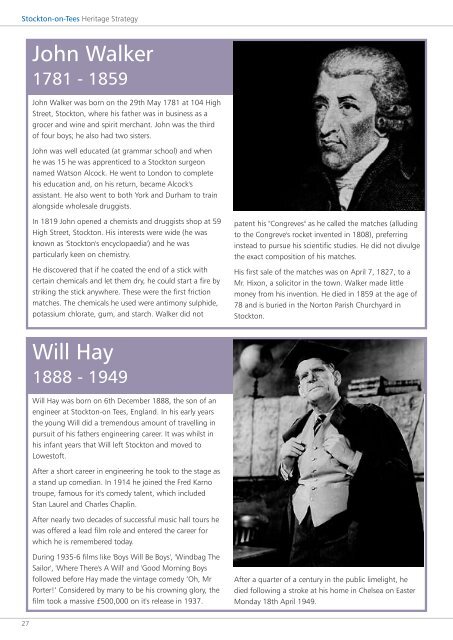Heritage Strategy - Stockton-on-Tees Borough Council
Heritage Strategy - Stockton-on-Tees Borough Council
Heritage Strategy - Stockton-on-Tees Borough Council
Create successful ePaper yourself
Turn your PDF publications into a flip-book with our unique Google optimized e-Paper software.
stockt<strong>on</strong>-<strong>on</strong>-<strong>Tees</strong> <str<strong>on</strong>g>Heritage</str<strong>on</strong>g> <str<strong>on</strong>g>Strategy</str<strong>on</strong>g><br />
john Walker<br />
1781 - 1859<br />
John Walker was born <strong>on</strong> the 29th May 1781 at 104 High<br />
Street, <str<strong>on</strong>g>Stockt<strong>on</strong></str<strong>on</strong>g>, where his father was in business as a<br />
grocer and wine and spirit merchant. John was the third<br />
of four boys; he also had two sisters.<br />
John was well educated (at grammar school) and when<br />
he was 15 he was apprenticed to a <str<strong>on</strong>g>Stockt<strong>on</strong></str<strong>on</strong>g> surge<strong>on</strong><br />
named Wats<strong>on</strong> Alcock. He went to L<strong>on</strong>d<strong>on</strong> to complete<br />
his educati<strong>on</strong> and, <strong>on</strong> his return, became Alcock's<br />
assistant. He also went to both York and Durham to train<br />
al<strong>on</strong>gside wholesale druggists.<br />
In 1819 John opened a chemists and druggists shop at 59<br />
High Street, <str<strong>on</strong>g>Stockt<strong>on</strong></str<strong>on</strong>g>. His interests were wide (he was<br />
known as '<str<strong>on</strong>g>Stockt<strong>on</strong></str<strong>on</strong>g>'s encyclopaedia') and he was<br />
particularly keen <strong>on</strong> chemistry.<br />
He discovered that if he coated the end of a stick with<br />
certain chemicals and let them dry, he could start a fire by<br />
striking the stick anywhere. These were the first fricti<strong>on</strong><br />
matches. The chemicals he used were antim<strong>on</strong>y sulphide,<br />
potassium chlorate, gum, and starch. Walker did not<br />
patent his "C<strong>on</strong>greves" as he called the matches (alluding<br />
to the C<strong>on</strong>greve's rocket invented in 1808), preferring<br />
instead to pursue his scientific studies. He did not divulge<br />
the exact compositi<strong>on</strong> of his matches.<br />
His first sale of the matches was <strong>on</strong> April 7, 1827, to a<br />
Mr. Hix<strong>on</strong>, a solicitor in the town. Walker made little<br />
m<strong>on</strong>ey from his inventi<strong>on</strong>. He died in 1859 at the age of<br />
78 and is buried in the Nort<strong>on</strong> Parish Churchyard in<br />
<str<strong>on</strong>g>Stockt<strong>on</strong></str<strong>on</strong>g>.<br />
Will hay<br />
1888 - 1949<br />
Will Hay was born <strong>on</strong> 6th December 1888, the s<strong>on</strong> of an<br />
engineer at <str<strong>on</strong>g>Stockt<strong>on</strong></str<strong>on</strong>g>-<strong>on</strong> <strong>Tees</strong>, England. In his early years<br />
the young Will did a tremendous amount of travelling in<br />
pursuit of his fathers engineering career. It was whilst in<br />
his infant years that Will left <str<strong>on</strong>g>Stockt<strong>on</strong></str<strong>on</strong>g> and moved to<br />
Lowestoft.<br />
After a short career in engineering he took to the stage as<br />
a stand up comedian. In 1914 he joined the Fred Karno<br />
troupe, famous for it's comedy talent, which included<br />
Stan Laurel and Charles Chaplin.<br />
After nearly two decades of successful music hall tours he<br />
was offered a lead film role and entered the career for<br />
which he is remembered today.<br />
During 1935-6 films like 'Boys Will Be Boys', 'Windbag The<br />
Sailor', 'Where There's A Will' and 'Good Morning Boys<br />
followed before Hay made the vintage comedy ‘Oh, Mr<br />
Porter!’ C<strong>on</strong>sidered by many to be his crowning glory, the<br />
film took a massive £500,000 <strong>on</strong> it's release in 1937.<br />
After a quarter of a century in the public limelight, he<br />
died following a stroke at his home in Chelsea <strong>on</strong> Easter<br />
M<strong>on</strong>day 18th April 1949.<br />
27

















